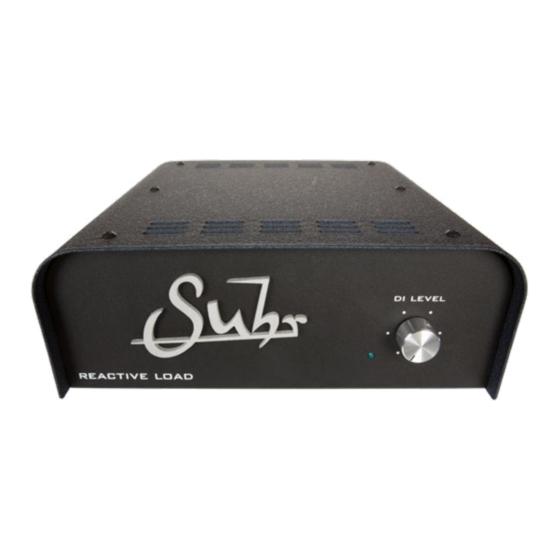
Advertisement
Quick Links
Advertisement

Subscribe to Our Youtube Channel
Summary of Contents for Suhr REACTIVE LOAD
- Page 1 REACTIVE LOAD ™ USER GUIDE...
- Page 2 WHAT IS A REACTIVE LOAD? The Reactive Load is a passive analog model of an actual speaker cabinet. It is comprised of resistive, inductive, and capacitive elements and has each of its various elements arranged in empirically derived proportions so as to generate the exact response a popular 8 ohm 4x12 speaker cabinet presents at the output of a guitar or bass amplifier. As a result, the Reactive Load is able to produce the same non-linear impedance vs frequency characteristics as a typical speaker cabinet.
- Page 3 OVERVIEW The Suhr Reactive Load delivers a simple solution to capture all of the warmth and dynamics of your playing, without the hassle of miking a speaker cabinet during a live or recorded performance.
-
Page 4: Front Panel
Adjusts the output level of the balanced and unbalanced DI / Line Out outputs (located This indicator provides a visual representation of the signal flow from your amplifier to on the rear panel). DI Level is used to optimize the amount of signal the Reactive Load the Reactive Load. -
Page 5: Back Panel
INPUT - From Amp (8 Ohm/100 Watts RMS Max.) the connected speaker cabinet. NEVER CONNECT THIS OUTPUT TO INSTRUMENT, Connect the speaker output from your amplifier to the Input on the Reactive Load using MIC OR LINE LEVEL INPUTS. a speaker cable. -
Page 6: Specifications
We encourage international customers to purchase through your local distributor or dealer for this reason. Our international distributors are setup to handle warranty issues in their respective countries. If you do not have an authorized Suhr dealer in your country, please contact us direct for further details.
Need help?
Do you have a question about the REACTIVE LOAD and is the answer not in the manual?
Questions and answers